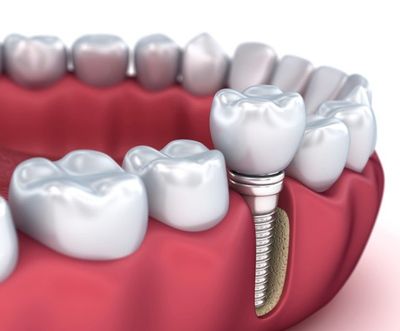Dental Implants
What are Dental Implants?
Dental Implants are the closest to the look, feel and function of your natural teeth and are the gold standard for tooth replacement. More and more people are getting dental implants to replace missing teeth.
Dental implants are a long-term solution where small titanium ‘roots’ or implants are placed in your jawbone that act as the foundation with which a replacement tooth (crown) or replacement teeth (bridge) can be placed and fixed.
Unlike other tooth replacement options like fixed dental bridges or removable dentures, dental implants will not affect neighbouring healthy teeth or lead to bone loss in the jaw if properly placed and cared for.
Following extractions, the bone (where the tooth used to be in) resorbs away giving an aged appearance to the smile and face. Placing dental implants at the time of extraction or soon after within a few months prevents this bone loss and provides you with a healthier smile and younger looking appearance.
Why should I get Dental Implants?
The benefits of Dental Implants far outweigh the small risks and expense in the longer term. Dental Implants allow you to:
- Eat what you want, when you want
- Improve appearance
- Improve speech
- Enjoy food again
- Eat with comfort
- Look younger
- Improve self-esteem and smile
- Enjoy a long-term solution
Aside from being the most popular option to replace missing teeth, the loss of even a single tooth especially in the smile zone can have a big impact on your self-esteem and everyday life as most people will avoid smiling, causing them to appear less social, or more unhappy/rude which can lead to workplace and relationship issues generally associated with a 'gap or two' in their smile.
Regardless of the aesthetic, functional or psychosocial reasons, missing teeth should be replaced. Each and every single gap in your mouth or smile can lead to more potential problems with the adjacent teeth and pose problems to your long term overall dental health.
Whilst a gap in your mouth is not a medical emergency it can lead to a chain reaction where the opposing teeth in the jaw above or below can grow longer into the gap, or adjacent teeth next to the gap can tilt and fall over the gap and affect one's own periodontal gum health in the process, potentially compromising them. Missing teeth, especially missing multiple teeth, can affect nutrition and well-being as the types of food that can be consumed are often limited, hence resulting in nutritional deficiencies. Denture wearers are a classic group where it is hard to eat certain nuts, seeds, fruits and vegetables and even a few dental implants can be used to anchor the denture and convert it to an over-denture so it can function better with these higher fibre, less processed foods. Just this simple conversion from a denture to over-denture can have long lasting health benefits.
How do the Dental Implants get fixed in the jaw bones?
After a surgical procedure to place the implants in the bone, the small titanium Dental Implants have a surface that allows bone cells to produce and lay down new bone onto the implant surface and essentially with time the implant fuses to the jawbone through a process called osseointegration, or integration of the metal and bone.
The process of fusion takes several months but it is worth the wait, as the implant will never move or slip like a denture and it will resist the loss of adjacent bone by stimulating the osseointegration process.
Dr Webster, a Specialist Oral and Maxillofacial Surgeon (OMS), has the specialised education and training in the complexities of the bone, skin, muscles and nerves involved, to ensure you achieve the best possible results. A 2014 study
suggests greater implant success rates when performed by a dental specialist.
How long does it take to get Dental Implants?
The fastest treatment can be completed in a day or take up to 18 months from initial consultation with Dr John Webster depending on the findings at your initial consultation and your treatment plan.
The first step is a comprehensive initial dental implant consultation where your goals of treatment are assessed with the available teeth, gums and bone. Successful Dental Implants that will last a long time and be free of any problems require adequate quality and quantity of bone in the jaws and adequate quality and quantity of the correct type of soft tissues to heal around the top of the implant surface.
If you meet the criteria for implant placement, in select cases, implants can be placed on the same day the tooth is extracted however if there are some concerns about enough bone or soft tissue available in the optimum location then a grafting procedure may have to be completed. The grafting procedure will add bone or soft tissue and the implant placement would then be delayed hence there is a wide spectrum of treatment times. Dr Webster will advise you of your treatment times.
The time taken in the treatment chair is just a small part of the overall journey with many hours of planning and production occurring before the dental implant is even placed. This includes 3D computer guided planning, manufacture of surgical guides, temporary tooth replacement options and final restorations/crowns.
Once your customised detailed treatment plan is completed with Dr John Webster then the team at Oral Facial and Implant Centre can provide you with the detail of the costs and number of appointments needed to achieve your treatment goals.
As a guide for a single implant, on the day of surgery you will have local anaesthetic, small incisions in your gum, placement of the dental implant in the jaw bone and closure with small sutures that resorb by themselves. Once osseointegration or fusion has been completed between the implant surface and bone, usually within 3-6 months after implant placement, you will return for a second small surgery. Under local anaesthetic an abutment will be placed (see video link above) and a digital impression of your mouth is taken to facilitate the manufacture of a final crown that will be attached to the implant by your restorative Dentist.
In some cases the referring Dentist will ask Dr John Webster and the Oral Facial and Implant Centre to also place the final restoration/crown and this is secured to the implant with a small screw/cement 1-2 weeks after the abutment is placed to not only restore the missing tooth, but also your confidence, function and smile.
What are the costs of Dental Implants? How long does it take to get Dental Implants?
The cost of dental implants (including the crown/tooth on top of the implant) varies in Toowoomba and the Darling Downs, usually between $3500 - $5000 per implant, or $15,000 - $25,000 for a single arch All-on-4® or All-on-Any implant procedure. This total fee should include placement of the dental implant/s, any grafting of bone and soft tissue to facilitate placement, and placement of the final crowns fitted to the implant/s.
The wide variation in cost is due to the large number of brands of componentry, grafting materials and restorations/crowns available. Some patients prefer the most expensive brands and materials and want to know they are getting a premium product and willing to pay for the most expensive component involved in each step.
While a higher fee does not guarantee a better outcome, Dr John Webster will always advise the most cost effective material to achieve your treatment goals as often you do not require the most expensive brand to achieve long term success.
The cost of poor quality dental implant work in the third world and developing countries with the rise of dental and medical tourism is also providing a steady stream of expensive revision work to Dr John Webster. It is unwise to compromise the quality of your treatment and experience potential complications in order to save on upfront costs. Many implant systems are available internationally that do not meet the Therapeutic Good Association (TGA) requirements of the Australian health regulators and simple metal additives in the dental implants can have devastating effects in as short as a few months post treatment.
There are several things you should consider when comparing dental implant costs.
1. Implant Components
Choosing high quality componentry from long term leading dental implants brands will ensure you have access to long term success and low risk of complications. See the next section on Latest Technology in Dental Implants to learn more about the brands Dr John Webster uses to find cost effective solutions. If there are issues with a fractured crown in the future or any other component it is important to use a brand that is likely to still be around in 20-30 years so that spare parts are readily available. All brands available at the Oral Facial & Implant Centre fit the above criteria.
2. Surgeon Specialisation & Experience
Diagnosis, treatment planning and implant surgery is highly technical. Poorly executed surgery can have serious long-term consequences. Just as you would not choose your medical GP to perform face-lift surgery, you should choose a dental practitioner who is either a Specialist or one that has undertaken extensive post graduate training for any extensive and expensive implant treatment.
Specialist Oral and Maxillofacial Surgeons such as Dr John Webster, are the original implant specialists in Australia and remain the only dental specialists allowed to place dental implants for the Department of Veteran’s Affairs (DVA). Contemporary trained surgeons also know the importance of planning each case from the desired end point back to the initial consultation and placing bone graft where needed to facilitate the optimum outcome.
Any dental practitioner can place dental implants and Dr John Webster is involved in teaching general dentists how to place dental implants and restore them for simple cases. For more complex cases and to ensure all potential pitfalls and complications are avoided, the Oral Facial and Implant Centre suggests you involve a Specialist Oral and Maxillofacial Surgeon in your treatment planning and placement of the dental implant to achieve your desired results.
Before embarking on a potentially costly dental implant treatment plan, it pays to seek a few opinions and also ask how many implant surgeries they have performed, how long they have been doing dental implants, what brand of components will be used and look for their credentials.
3. Treatment Complexity
The more complex a treatment, the more likely you will need the assistance of a Specialist Oral and Maxillofacial Surgeon to facilitate accurate placement and the more likely you will need the assistance of a Specialist Prosthodontist, and a dental specialist who has completed 3 more years of training in restoring teeth with crowns, bridges and dentures.
Where a tooth has been missing for many years, bone resorption may have taken place and bone or soft tissue grafting may be required before a dental implant can be placed in the ideal locations. Your medical history and medications will also affect your treatment so selecting a specialist on cost alone is not advisable. Each dental implant case is specific to you and requires the careful attention to detail to ensure long-term successful outcomes.
4. Centre Facilities
The Oral Facial & Implant Centre has access to all the latest technology and facilities needed to expedite your care in the safest and most predictable way. See our website section on Latest Technology in Dental Implants to learn more. At our conveniently located practice at St Andrew’s Hospital in Toowoomba you will have everything available to you to make your dental implant journey a successful one.
5. Warranty
While the dental implant success rate is as high as 95-98%, should an implant fail, a warranty is important. The warranty on the implant product enables Dr John Webster to replace your implant free of charge within an agreed time period. Reputable implant manufacturers, like the ones Dr Webster chooses offer this warranty which gives you peace of mind.
The secret to long term success is not just in an accurate placement and a nice looking crown, more-so about how you care for your new implant in the months and years after your surgery. Implant maintenance is the key for its longevity and is often neglected as a focus point from the patient at initial consultation. The Oral Facial & Implant Centre will ensure you and your Dentist are reminded to follow-up with appropriate implant aftercare. Dr John Webster will check there has been no movement of the implant within the bone and that the occlusion, or ‘bite’, is correct so there is no unnecessary loading and wear on the restoration/crown. Just as if you bought a new car you would arrange regular services, look after it, and ensure it lasts a long time, so too do you need to maintain your dental implant with routine dental visits.
For any further questions or information please contact one of our friendly team on 07 4580 4733.
Oral Facial & Implant Centre is built around providing our clients with predictable, cost-effective solutions in a timely manner using state of the art technology. If you would like to know how we can help you further, or to book a no obligation dental implant consultation please phone 07 4580 4733 or alternatively request an appointment now online.




